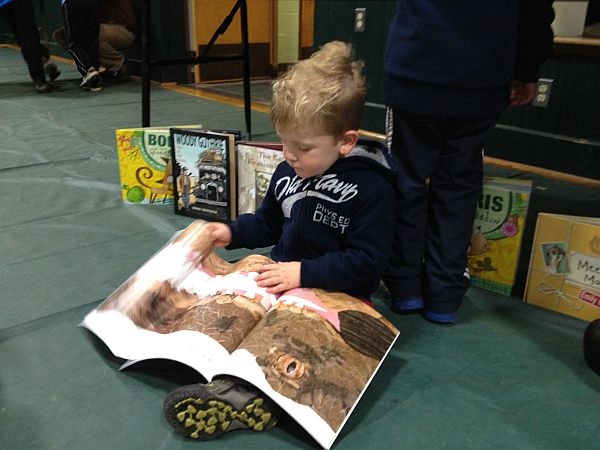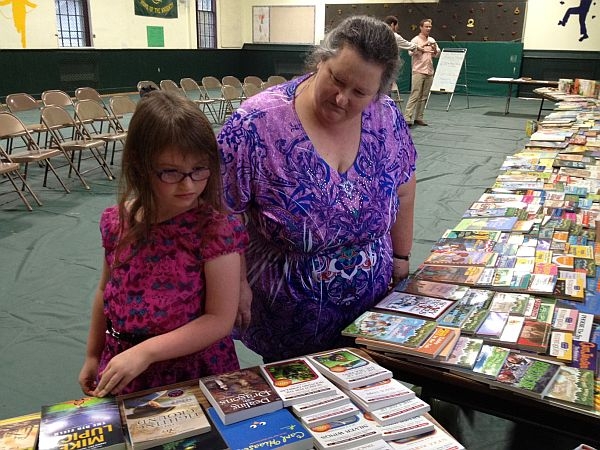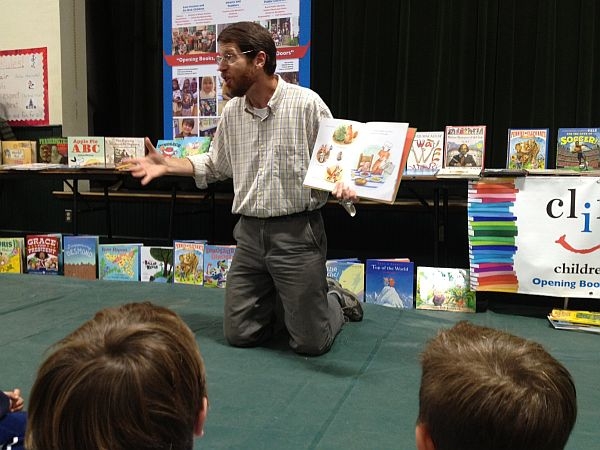
Studies show that children from low-income families score lower on reading tests than kids who can afford more of their own books.
So, one way to attack illiteracy is to give books to kids who need them. But as it turns out, it’s not enough to dump bestsellers on doorsteps. Adults need to read them aloud in a way that makes kids really listen, and want to read for themselves.
It’s "The Year of the Book" at Newbury Elementary School. The school is one of three in Vermont and three others in New Hampshire that are getting a lot of free books, and other pro-literacy programs, from a Vermont non-profit called the Children’s Literacy Foundation. Over the year, each child will get to take home 10 brand new books.
At a recent school open house in Newbury, parents and kids strolled into the gymnasium to browse a table loaded with children’s lit. Veronica Taylor is 8. She loves to read and she thinks her friends should, too. "So they could learn about anything that might have happened or read just to have fun and..yeah," Veronica explains.
 Kids who read "just to have fun," and not just because it’s homework, score higher on reading tests. But merely sending some free books home doesn’t necessarily make all that happen. Heidi Rosenberg is an analyst at Harvard Family Research Project. She says literacy programs should explicitly show parents how to make the most out of reading time at home.
Kids who read "just to have fun," and not just because it’s homework, score higher on reading tests. But merely sending some free books home doesn’t necessarily make all that happen. Heidi Rosenberg is an analyst at Harvard Family Research Project. She says literacy programs should explicitly show parents how to make the most out of reading time at home.
"What are some of those inflections you want to use and different methods of engaging kids with the pictures in the story or the text in it depending on their age level?," she asks. "What are those questions that you can ask children that are shown to help increase reading comprehension levels as opposed to just reading through the story, closing the books at the end and being done with it?"
Duncan McDougal is the founder and director of the Children’s Literacy Foundation, reading to the Newbury children in exactly the way Harvard professors might like to hear-and see. He crouches, he springs to his feet as he turns pages, he falls on the ground. McDougal gave up a job in finance to start this non-profit. He grew up in a reading family. McDougal says, "And as I grew up and went through college and was in the working world it eventually dawned on my how much of my ability to have a good job and to have opportunities in life really depended on my ability to read and write."
Neil White, a fourth grade teacher in Newbury, hopes to turn this book giveaway into just that kind of lasting gift for his students and their families. He turns students into book reviewers. And that’s not all.
 "Well, in my classroom I do a program called ‘bananas about books’ where I encourage the parents to read with their children for 15 minutes every night," White relates. "And it’s something that I have the parents sign every night."
"Well, in my classroom I do a program called ‘bananas about books’ where I encourage the parents to read with their children for 15 minutes every night," White relates. "And it’s something that I have the parents sign every night."
The question, of course, is whether all those parents are reading in a way to make their kids want more. That’s hard to know. But the Children’s Literacy Foundation is planning to collect some data over the next year or two to see if their programs are making a measureable difference to kids who take the freebies home.
Note: The Chidlren’s Literacy Foundation also funds writers in residence, classroom grants, and read-a-thons.